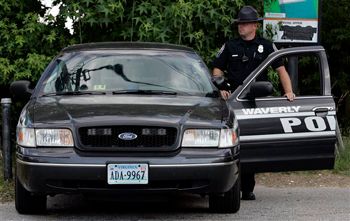By IAN URBINA
The Associated Press
RICHMOND, Va., — As of this week, Virginia has arguably become the worst place in the country to commit a serious traffic violation.
 Officer Reichhardt operates his radar as a truck passes by in Waverly, Va. (AP) |
To raise money for road projects, the state will now impose on residents who commit severe driving infractions a huge civil penalty, ranging as high as $3,000, in addition to existing fines and court costs.
The civil penalty for going 20 miles an hour or more over the speed limit, a violation defined by the state as reckless driving, will be $1,050, for example. First-time drunken drivers will face a civil penalty of $2,250. In both cases, judges can also continue to impose fines of as much as $2,500, plus court costs.
The offenders can pay the penalties in three installments over 26 months, but failure to pay will cost them their licenses. And forget about trying to outwit the police by using radar detectors. Virginia and the District of Columbia are the only places in the country where they are already illegal for passenger vehicles, according to the National Conference of State Legislatures.
The new traffic penalties are expected to raise $65 million a year and are part of an effort to improve the state’s roads without a tax increase. Virginia had an estimated shortfall of more than $500 million in its transportation budget in the last fiscal year.
New York and New Jersey have similar surcharges for certain traffic violations, with the revenue going to state transportation funds, and Delaware legislators introduced a like measure in June, said Anne Teigen, research analyst at the National Conference of State Legislatures. But none have penalties as large as Virginia’s, Ms. Teigen said.
“They’re ridiculous,” said Aaron Quinn, a spokesman for the National Motorists Association, which claims about 6,000 members. The very legislation that created the penalties “says its purpose is to generate revenue,” Mr. Quinn said, adding: “It’s essentially a tax on drivers and has nothing to do with safety. There is no evidence that increasing fines increases safety.”
Lon Anderson, director of public and government affairs for AAA Mid-Atlantic, disagreed.
“We wish the fines didn’t have to be so steep,” Mr. Anderson said, “but the issue was, Should we tax all motorists, through something like the gas tax, or should we tax just the worst drivers? The legislators chose the latter, and we agree with that decision. These aren’t minor traffic violations. You really have to do something severe to be fined.”
You also have to be a Virginian. The legislature opted not to apply the new penalties to out-of-state drivers, reasoning that enforcement would be too hard.
The civil-penalties initiative is among a package of new traffic safety measures taking effect in the state this week. In another, Virginia is renewing a program that allows local governments to set up cameras to catch drivers who run red lights. And children under 8 must now be in a booster seat, which was previously required only for children under 6.
The new laws also mean that chatty teenagers should beware. The state has begun forbidding youths under 18 who drive with provisional licenses to use even hands-free cellphones while behind the wheel.
Disobeying the cellphone ban is a “secondary” offense, so drivers can be fined only if an officer pulls them over for some other reason. The ban also has an exception that permits teenagers to use their phones in emergencies. Otherwise, convictions can cost up to $250.
The legislature adopted the ban in response to a spate of fatal accidents. Car crashes are the leading cause of death among teenagers, and the rate of fatal crashes among 16-year-olds is twice as high as among 18- and 19-year-olds, said Mr. Anderson, of the AAA. More than 90,000 Virginians will get driver’s licenses in 2007, most of them teenagers.
All in all, Mr. Anderson said, “it’s a very good year in Virginia for traffic safety with all these new measures.”
But the big new civil penalties, having barely taken effect, are already drawing fire.
Thaddeus Furlong, a defense lawyer from Fairfax who did a lot of work in traffic enforcement when he was a Virginia police officer, said the new fines would most likely have unintended consequences, like the gumming up of the court system as drivers file appeals in an effort to overturn their convictions or at least buy extra time before paying.
“I think the state is going to see a serious backlash from Mr. and Mrs. Middle Class,” Mr. Furlong said, “when they get to the clerk’s window and suddenly realize how much they owe.”

